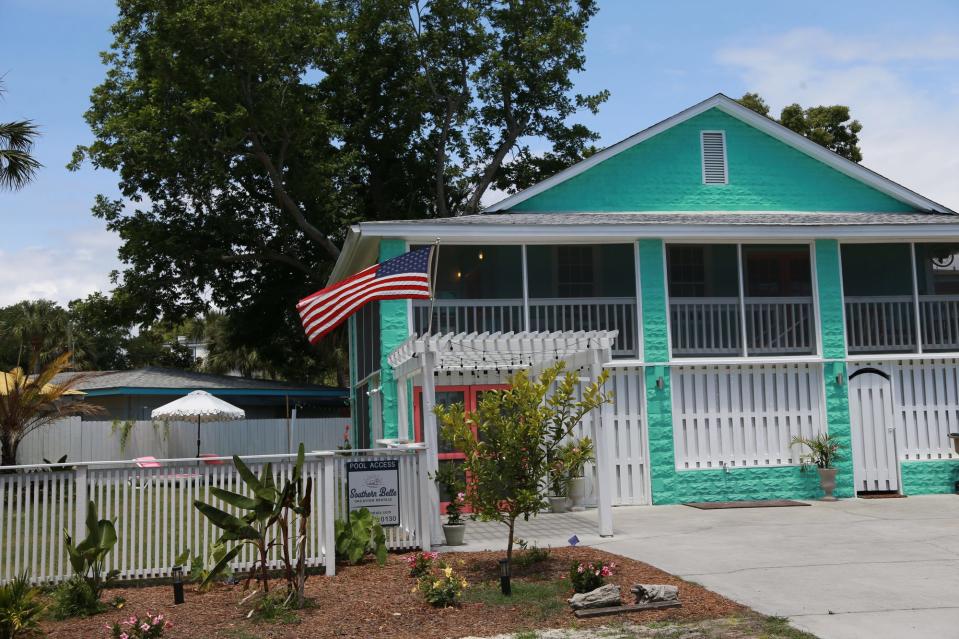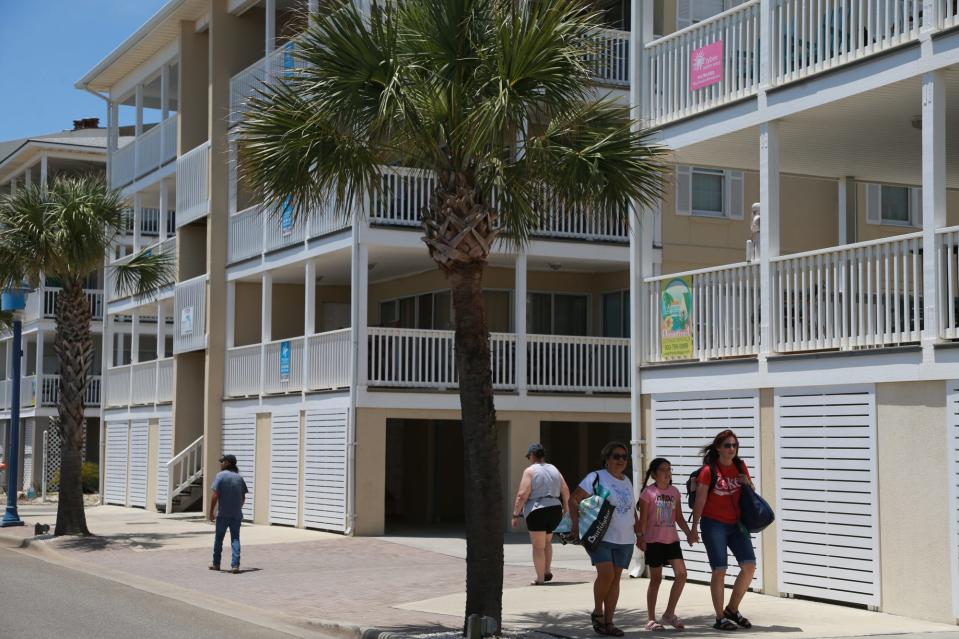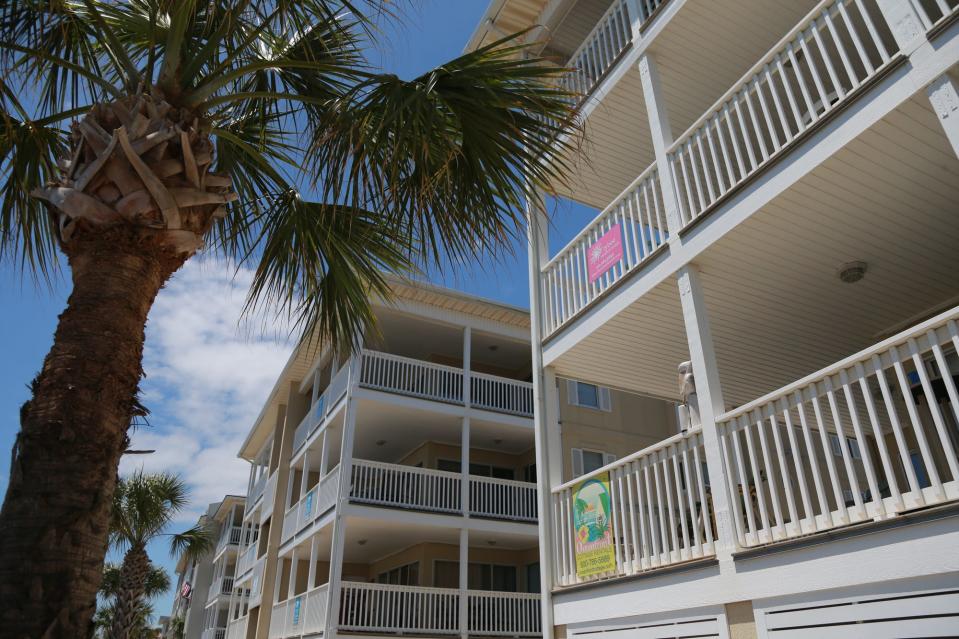Tybee council set to vote on significant short-term vacation rental regulations
After years of debate, Tybee Island may finally be putting substantial brakes on one of the beach town's main draws for visitors — short-term vacation rentals.
Wednesday night's council meeting will determine the fate of several proposed regulations regarding STVRs, which are houses or condos rented to guests for less than 30 days, such as an Airbnb.
More: Tybee Island council advances proposal to further restrict short-term vacation rentals
One ordinance would establish an occupancy rate for each rental and a cap on the number of STVRs allowed in residential areas. The occupancy rate outlines a maximum of two adults per bedroom and an additional two adults for the entire dwelling.
If council votes to pass the ordinance, the maximum number of STVRs allowed in residential zones will be limited to 760, which is believed to be the current number of permitted properties. That number puts the percentage of STVR properties in residential zones at about 38%.
If council doesn't take further action by June 15, 2022, the cap will sunset.
It's a proposal that has divided residents on the island.
More: Tybee City Council enacts short-term vacation rental moratorium; permits paused for 90 days
Also on Wednesday night's agenda is a resolution to extend the 90-day moratorium on issuing STVR permits to properties in residential zones. If passed by the council, the moratorium, which would have ended in December will be extended until April 30, 2022.
An extension would give the city extra time to "continue studies and to conduct hearings on proposals on the impact of short-term vacation rentals," reads the resolution.
More: Tybee Island moves forward on vacation rental regulations, moratorium town hall raises questions
Since the moratorium was enacted, the council has passed a fee structure based on occupancy rate and discussed other ideas for regulations such as parking, noise and other considerations. But passage of those regulations, including the occupancy rate itself, have stalled as council works out the details of each new rule and its potential loopholes.
The most controversial restriction is the potential cap on the number of rentals.
According to recently available data from the city of Tybee Island, nearly half (48%) of all dwelling units on the island hold STVR permits.
Yet the story behind the numbers is more complicated.
About 1,390 rentals are considered active, said City Manager Shawn Gillen in October. The city uses software called Host Compliance that scans rental websites to determine rental activity. Though it's imperfect, Gillen said, "it's as close as they can get it."
That puts the total number of active vacation rentals on the island at 43%.

Some residents, especially longtime Tybeeans, view limiting and perhaps decreasing this number as necessary to restoring a sense of community in their residential neighborhoods.
"I'm not anti-rental, but when you let it consume a community, I don't think it's the right thing to do," said Tybee resident Ron Bossick, "When you take a look at the Christmas parade, the pirate fest ... the group of people that live on this island make all this stuff happen."
Another concern is the additional strain on infrastructure, especially the water system. According to Tybee Island's 2016 Carrying Capacity Report, the city will need to reduce their water usage by 38% to reach the proposed limit for 2025.
"We have a very sensitive infrastructure, we all know that," said Mayor Shirley Sessions, who emphasized that the city needs to keep on track with the master plan.
On the other side of the argument, however, STVR owners, property management companies and Realtors view the potential restriction as an unnecessary reversal that could undercut what has always been an economic boon for the island.
"We brought our life's hard-earned savings to buy a condo, hoping to enjoy it most of the season," said Anita Matthewson, who lives in Beachside Colony along Butler Avenue. "For the off season ... we had to develop an economic plan to help pay for it, which is short-term vacation rentals."
Owners and potential buyers of Tybee property expect this investment opportunity, said Matthewson. Without it, the demand for the property goes down.
According to the city manager, STVRs contribute 73% of Tybee's hotel/motel tax. The city budget projects that hotel/motel tax revenues for 2021 and 2022 will be $3.7 million and $4 million, respectively. Those funds are earmarked for different projects and tourism marketing.
"My business is 85% to 90% tourism," said Susan Kelleher, owner of the gift shop Seaside Sisters. "I would not exist if it wasn't for tourism."

An accurate picture of tourists' total economic impact on the island is not yet clear. Tybee is still awaiting data from a Georgia Southern CBAER study planned for completion next year that will show visitors' - both day-trippers and overnight travelers' - spending habits on the island.
Unanswered questions on both sides fuel calls to slow down or speed up restrictions, leading to stagnation. Permanent residents have expressed frustration with the wait, as they say effects of tourism are real and have long been felt.
For years, residents have seen friends and neighbors leave the island. Instead, they're replaced by rotating groups of visitors.
"If you can imagine in your home ... when you open your garage door to the front of your house ... and you have four to five groups of people that you don't even know, just sitting there watching everything you do, it's just a very unique feeling," said Bossick. "It didn't used to be this way."
Residents say unmanageable traffic, noise, and unaffordability — which perpetuates the need for owners to rent out their properties for extra income — have gradually driven some out.

Some blame the ills on day-trippers; others, on renters. The back-and-forth on who is responsible for what has contributed to deadlocks on the STVR issue in the past. But how the city council chooses to move forward now is what residents will be watching for.
"I don’t hate tourists or businesses that make money off tourists or off our natural resources," said longtime resident Shirley Wright at the most recent council meeting, "but i do want to know when will it be enough. ... When will there ever be enough time to say the same things?"
UPDATE: On Wednesday night, the council unanimously approved an extension of the 90-day moratorium on short-term vacation rentals (STVRs) and established a maximum occupancy rate. They stalled the decision to cap the number of STVRs allowed in residential areas until further research is complete.
Nancy Guan is the general assignment reporter covering Chatham County municipalities. Reach her at nguan@gannett.com or on Twitter @nancyguann.
This article originally appeared on Savannah Morning News: Tybee Island will vote on more short-term vacation rental regulations

